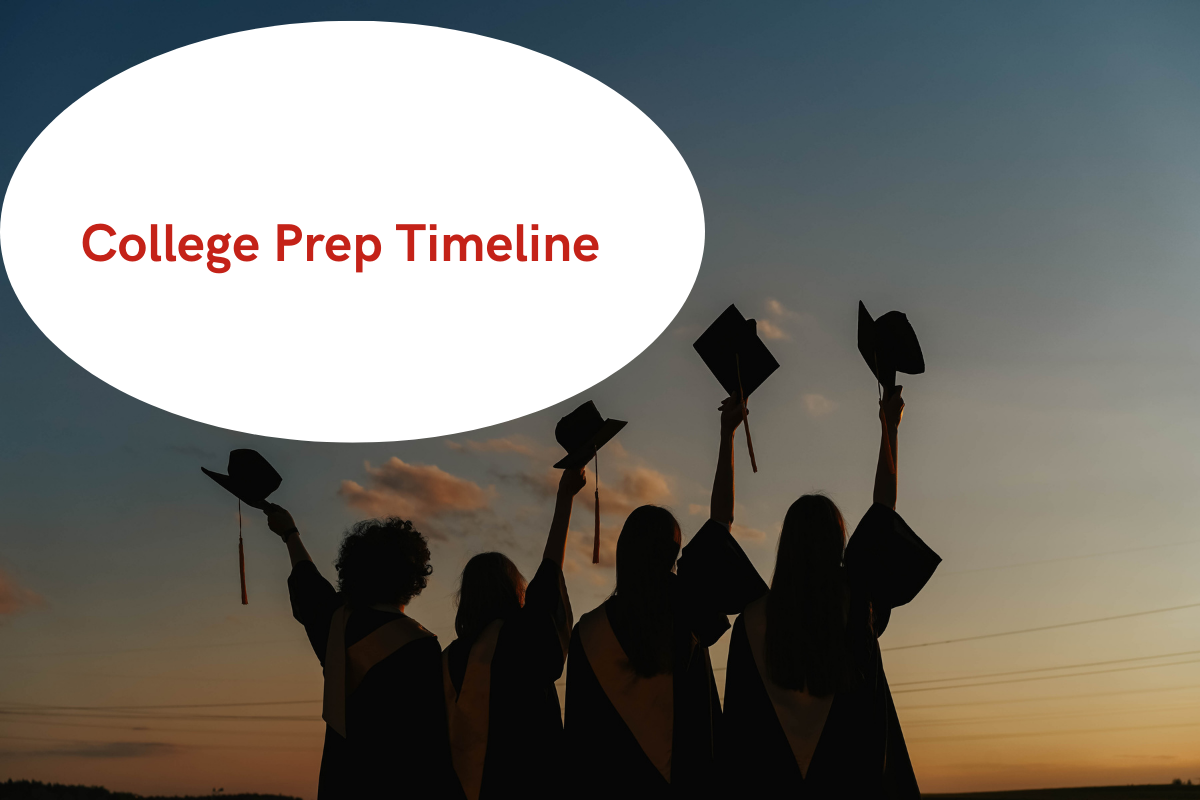We previously covered ways that you can prepare for college in high school. Today, we’ll put those tips and more on this handy timeline so that you can know what steps you should be taking during every year of high school.
Freshman Year
- Start talking to your high school guidance counselor. Discuss and explore your interests and get their thoughts on the classes you should take as well as possible majors.
- Take college-prep courses. Getting into your top-choice school can’t be done by just meeting minimum graduation requirements. From freshman through senior year, you should be taking opportunities to sign up for college prep and advanced placement courses. Focusing on your core classes like English, math, science and history are a given. You’ll also want to make sure you excel in any classes that might relate to your future major if you’ve already decided.
- Develop good study habits. The grades they’ll help you achieve are important but taking the opportunity to develop good study habits in high school will also help you with your college coursework.
- Focus on your grades. Another reason to develop your study habits is that your high school transcript is considered one of the most important parts of your college application.
- Look into and participate in extracurricular or volunteer activities. These activities are a great way to highlight your talent and even your leadership abilities during the college application process.
- Take notes on the classes you did well in. And consider asking those teachers for recommendation letters.
- Consider taking the PSAT. Sophomore year is the most popular time but students prepare as early as eighth grade. You can take the test in October and review your results in January. Take note that only PSAT scores taken during 11th grade count toward National Merit Scholarship rank)
- Start a notebook or spreadsheet committed to your high school career highlights. This short list of your academic or extracurricular achievements is a good reminder of strengths to cite when applying to colleges as well as people from whom you can get a recommendation letter.
Sophomore Year
- Start researching schools. While you’re doing so, think about what you value in the school, what majors they offer and what their admissions requirements are.
- Subscribe to College Board’s email list. That way they’ll send you reminders of important test dates.
- Start developing your writing skills. Sophomore year is a good time to begin refining your writing skills. You should also set aside your writing assignments to know where you can improve as well as provide inspiration when you need to write your college admissions essay. (Something that’s increasingly important as schools drop testing requirements)
- Make an attempt at taking the PSAT in October and review your results in January.
- Continue maintaining a high GPA
- Maintain participation in one or two extracurricular activities. It’s more important to demonstrate commitment, follow through and the ability to make an impact than juggling a large number of activities.
- Look up educational activities that you can partake in over the summer before junior year. You’ll definitely want to enjoy your summer vacation but do avoid falling into the summer slump.
- Talk to current college students. Pick their brains about college life and their campus if it’s a school you’re considering attending.
Junior Year
- Prepare for the SAT and/or ACT. Check out our blog here for a breakdown of the differences.
- Talk to your AP coordinator about the AP exams, which provide an opportunity to earn college credit, and begin preparations. The planning period is typically between July and September.
- Continue maintaining a high GPA.
- Continue to participate in extracurricular activities.
- Do more thorough research on schools. Make a list categorized into reach, target, and safety schools.
- Narrow down your list and begin scheduling college tours.
- Attend a college fair. College fairs allow you to find out about multiple schools at once. They’ll also have representatives in attendance to answer specific questions you have.
- Take the PSAT in October. This time, as a Junior, your PSAT score can help you to qualify for the National Merit Scholarship.
- Register to take the ACT exam and/or the SAT. When registering, you can request to send free score reports to some colleges you’re applying to. Find out if you qualify for an SAT fee waiver here or an ACT fee waiver here.
Learn more about SAT and ACT Preparation Bootcamps here.
- Take AP exams in May.
- Revise your college application essays. Ask a teacher to proofread your application essays and then make any revisions and prepare final drafts before college applications are due.
- Gather and organize your college application materials. Make sure you have the necessary materials for college admissions including forms, test scores, essays, recommendation letters, and transcripts.
- Work on your college admissions essay over the summer.
- Start applying to colleges. Check out this article from College Raptor which explains the process and differences for early decision, regular decision, and rolling admissions.
Related: What Colleges Look for on Successful Applications
Senior Year
- Keep up with your GPA. Don’t develop senioritis feeling like “you’ve made it.” Colleges have been known to revoke admissions.
- Retake the SAT or ACT if you didn’t achieve the score you need already. Even though you can retake the tests, be careful. Taking them more than three times may reflect poorly and be perceived as a lack of preparation.
- Complete the FAFSA by the March 2 deadline.
- Submit your “Intent to Enroll” to the college you will be attending by the May 1st deadline also known as college decision day.
- Request your final transcript to be sent to the college you will be attending.
- Complete ongoing enrollment paperwork for your college—Once you’ve decided on a college, you will receive updates regarding orientation, scheduling, housing, etc. Complete all paperwork by the necessary deadlines.
- Attempt to appeal a rejection or waitlist placement. It’s not a guarantee but does work from time to time and is thus worth trying. Also, some students who were accepted end up dropping out before the first day.
- Celebrate your graduation from high school! You’ve put in a lot of work up to this point and don’t forget to celebrate this achievement.
Wrap up
This handy list of tasks should help you to stay on track from Freshman to Senior year with all of the tasks you need to complete to prepare for college. If you find it all a bit overwhelming, contact FLS for a free consultation on college admissions counseling.

